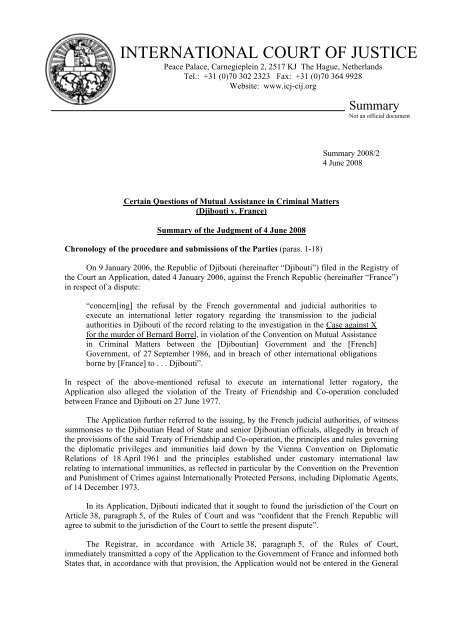Discovering the Historical Background of Letters Rogatory in Legal Frameworks
Discovering the Historical Background of Letters Rogatory in Legal Frameworks
Blog Article
Letters Rogatory Explained: Facilitating Legal Collaboration In Between Countries

Definition of Letters Rogatory
Letters rogatory are official requests made by a court in one territory to a court in another jurisdiction, seeking support in obtaining evidence or testimony for a legal action. This step-by-step device is necessary in the context of worldwide regulation, where legal systems may vary, and cross-border collaboration is needed. Letters rogatory help with the celebration of details that may be essential for adjudicating instances, particularly in instances entailing complicated transnational issues.
Normally, these requests develop in civil, criminal, or management matters where an event needs evidence that lies outside the territory of the requesting court. The letters offer as a method to make sure that the concepts of due procedure are upheld, enabling courts to access proof that might otherwise stay inaccessible due to geographic or lawful barriers.
The usage of letters rogatory is regulated by worldwide treaties, reciprocal contracts, or domestic legislations, which mark the treatments and commitments of the courts involved. It is very important to note that the implementation of such requests is not ensured; they depend on the legislations and techniques of the jurisdiction receiving the letter. Therefore, letters rogatory are a crucial device for fostering legal teamwork and guaranteeing justice throughout boundaries.
The Process of Issuing Letters Rogatory
Issuing letters rogatory includes an organized procedure that makes sure conformity with both worldwide and domestic lawful criteria. The requesting party, usually a court or legal authority, drafts a formal request detailing the nature of the assistance sought, the evidence or information required, and the lawful basis for the request. This paper has to be specific to promote understanding by the international territory.

The next action includes transferring the letters rogatory to the assigned foreign authority. This is often done via polite networks or global lawful aid frameworks, guaranteeing that the demand is received and recognized by the foreign court. The international court then processes the demand according to its very own lawful procedures, ultimately replying to the requesting party with the sought-after info or evidence, hence promoting international legal teamwork.
Significance in International Law
The significance of letters rogatory in international legislation can not be overemphasized, as they work as a crucial system for judicial participation across borders. These official ask for assistance in legal issues enable courts in one territory to inquire, evidence, or the presence of witnesses from one more jurisdiction, therefore promoting the management of justice in transnational situations.
Letters rogatory are especially crucial in the context of globalization, where legal disagreements frequently cover numerous nations. They enable the collection of proof that could otherwise be hard to reach, making sure that lawful proceedings are informed and fair. By cultivating cooperation between judicial systems, letters rogatory help promote the policy of law and advertise mutual regard amongst nations.
Moreover, the usage of letters rogatory demonstrates a dedication to global norms and principles of teamwork, showing the interconnected nature of modern-day legal methods. It shows the value of adhering to well established procedures and treaties, such as the Hague Convention, which offers a framework for these requests - Letters rogatory. Eventually, letters rogatory improve the efficacy of legal processes, making sure that justice is not prevented by geographical boundaries
Difficulties and Limitations
In spite of their relevance, letters rogatory face numerous obstacles and constraints that can restrain their performance. One main problem is the differing legal frameworks and treatments across territories, which can result in misunderstandings and delays in the implementation of requests. Various countries may have unique requirements for the validity of letters rogatory, making complex the process better.
In addition, the typically protracted nature of worldwide legal cooperation can prevent timely access to proof or witnesses. This delay might detrimentally affect continuous investigations or legal proceedings, particularly in cases requiring immediate activity. The absence of resources and training in some jurisdictions can result in insufficient handling of requests, leading to click resources poor or insufficient responses.
Cultural distinctions and differing mindsets in the direction of legal procedures can also position significant obstacles. For instance, nations with less formal legal systems may struggle to comply with the step-by-step rigor expected in letters rogatory. Finally, political stress between countries can influence the willingness to execute requests, resulting in an absence of cooperation and diminishing the energy of this system in international legislation. These obstacles demand constant dialogue and reform to boost the efficiency of letters rogatory in legal participation.
Study and Instances

Alternatively, obstacles can develop, as seen official site in a situation including a European nation seeking evidence in a continuous criminal matter from a non-EU nation - Letters rogatory. The process was postponed because of administrative difficulties and varying lawful standards, inevitably preventing the examination
These instances illustrate that while letters rogatory can promote global cooperation and expedite lawful procedures, they also highlight the demand for clear interaction and understanding of legal frameworks in between countries. Such study underscore the importance of refining this device to enhance effectiveness and efficiency in worldwide legal matters.
Conclusion
In recap, letters rogatory function as an important device for promoting lawful collaboration between countries, guaranteeing the collection of proof and testimony across jurisdictions. Their value in global legislation can not be overstated, as they promote due process and improve the performance of cross-border lawful proceedings. Obstacles such as varying political tensions and legal structures might hinder their effectiveness. Continued efforts to enhance and enhance the procedure are essential for promoting more powerful international judicial partnership.
Letters rogatory are official demands made by a court in one territory to a court in another territory, seeking help in obtaining evidence or testament for a lawful proceeding. The asking for celebration, typically a court or legal authority, drafts a formal request detailing the nature of the aid looked for, the evidence or details required, and the lawful basis for the request. The international court then refines the demand according to its very own lawful procedures, inevitably reacting to the requesting event with the in-demand info or evidence, thus facilitating global legal participation.
In addition, the see here now use of letters rogatory demonstrates a commitment to international norms and principles of teamwork, showing the interconnected nature of modern legal methods.Global legal cooperation via letters rogatory is not without its real-world implications, as highlighted by different situation researches that highlight both difficulties and successes.
Report this page